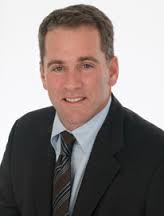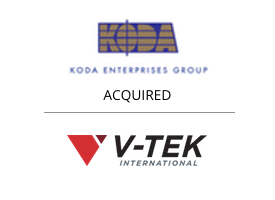
Investment Banking firm Exit Partners ramps up for another banner year
James Frye, former owner of Texas-based 5J Oil Field Services, LLC and 5J Trucking, LLC, hired lower middle market M&A…
Tags
 William (Bill) Karol started Koda Enterprises Group, a long-term holding company, in 1989, after running a plastic injection molding company in the late 70s and early 80s.
William (Bill) Karol started Koda Enterprises Group, a long-term holding company, in 1989, after running a plastic injection molding company in the late 70s and early 80s.
Koda, which focuses on the manufacturing and specialty distribution industries, currently has five companies in its portfolio and looks to do one to two deals each year. In March 2017, Koda purchased specialty manufacturing company V-Tek after connecting with their advisor, SealedBid Marketing, on Axial.
We talked to Bill about why V-Tek was such an attractive opportunity, what differentiates Koda from the typical PE firm, and why he likes shopping for businesses a lot better than selling them.
Axial: What interested you about V-Tek?
Bill: We bought V-Tek back at the end of March. We’d heard of [their advisor] SealedBid, but we weren’t on their radar screen before meeting through Axial. V-Tek is exactly what Koda looks for. The company manufactures very specialized packaging equipment, and also provides engineering services and distributes products to people who make sophisticated equipment, like medical or aerospace equipment.
A lot of the private equity companies with fairly good-sized funds look at EBITDAs between, say $5 and $25 million dollars. We typically look at EBITDAs around $3 to $5 million — you might say we’re the Triple-A farm league versus the Major Leagues, at least when it comes to the size of our target companies.
It works for us. We’re looking for smaller, more niche companies that we can help grow. We use the term sustainable niche, because with a lot of niche companies, there’s a reason why they’re small, and it’s clear they’re not going to grow. We look for businesses with clear organic growth potential.
 What’s your plan for V-Tek moving forward?
What’s your plan for V-Tek moving forward?
We actually just got back from a trip to Minnesota, where V-Tek is based. First, we want to understand the organic opportunities for the business and leverage those. For example, the company was holding off on hiring another software engineer because they didn’t have the budget. When we met with them yesterday, we told them, “Now’s the time to hire if we want to get to all the initiatives we’ve discussed.”
But that’s just the organic part. We also want to work with them to make a list of good acquisition targets and contact them directly. V-Tek acquired a company out on the West Coast about four years ago that sells to a similar customer base. It was a great strategic fit, and that’s the type of company that we’ll continue to look to add on to the business in the future.
Koda is a long-term holding company. How does this impact your relationship with portfolio companies?
We don’t really have an exit strategy, because we don’t use other people’s money, just our own. This is attractive to a lot of people because it means they don’t have to look over their shoulders every four or five or seven years — whatever the typical window of a private equity firm would be. We have a company in our portfolio that we acquired in 1998. It’s still there.
It’s not that we don’t sell companies, because we do. That’s how we generate capital to acquire other companies. But the timing is our timing. It’s when we choose to do it, which is when somebody wants to pay an unreasonably high price for something we own, as opposed to when we have to liquidate a company to get money back to our investors.
What’s an example of a niche business you’ve grown and then sold?
In 1989 we bought Monson Chemicals, Inc., a small commodity chemical distribution business. We knew right when we bought it that we didn’t want to be in commodity chemicals. We wanted to be in specialty chemicals, because your customer base is much stickier. Once you’re engineered into a product, it’s very difficult for the company to change the formulation — it would cost them a fortune. Once you’re in, you’re in.
So we immediately acquired two specialty chemical companies, and after that, we acquired eight more specialty chemical companies throughout the country.
We ended up selling that company in 2010 to Audax, after building it from $20 million in sales and losing money, to $300 million in sales. Audax went on to build it up to just under a billion in sales in five years before reselling it to a European company.
Beyond growth potential, what do you look at when evaluating potential acquisitions?
Once we understand whether the business is sustainable, the most important thing is people. That’s everything. We spend an inordinate amount of our time evaluating our people and supporting them and helping them grow. If they’re not the right fit we will make changes, but more often than not, it’s about giving them the right environment to thrive in.
For example, the founders of V-Tek are a husband and a wife who are both in their 80s now. They were spending limited time at the company and had hired a COO to build out a management team about six years ago. But still, the founders were hesitant to sign off on any strategic initiatives. The management team was a bit held back by that, but now [with our investment] they have the opportunity to do some of the things that they’ve been wanting to do and really shine. We’re going to unleash them a bit. Time will tell if we’re making the right choice or not, but I think we are.
You’ve been in M&A for more than 25 years. What’s your favorite part of the job?
I love meeting owners, particularly when they’re the entrepreneurs that started the company up. We’re looking at a business right now where the owner is a real Texan type of guy. He wears cowboy boots, his kid does rodeo, he puts snuff in his mouth and spits it out. He started the business from nothing, and he’s great with customers. Selling companies — I don’t like that as much, because I always feel a little bad that those relationships are gone — but I love shopping for companies. It’s just fun to meet all types of different people, and I learn from every experience.
